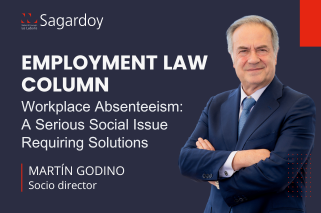We Live in Times of Legal Uncertainty — or at Least Unpredictability — Regarding Severance Compensation. Following the decision of the European Committee of Social Rights, the limits on severance pay for dismissal are now being called into question. Inevitably, this has sparked opposing voices both for and against its application. At this juncture, we will not dwell on this specific issue but simply point out that a legal system cannot be deemed entirely just if it does not prioritize the principle of legal certainty. This stands regardless of whether the legislative solutions adopted at any given time to address emerging societal challenges are appropriate or not.
Legal actors in the labor field — including companies, employees, and unions — need to understand the consequences of their actions. Ultimately, they require certainty and predictability to make decisions and act confidently, irrespective of whether they agree with the legislator’s solution to a particular problem.
Within this context, we raise an additional uncertainty regarding severance compensation that may have gone unnoticed or underestimated in the private sector, despite its clear repercussions in the public sector. This concerns compensation for the abuse of fixed-term employment contracts — specifically, the granting of damages to an employee to redress harm caused by the employer’s abusive use of temporary employment relationships.
Our starting point, to avoid unnecessary elaboration, is the doctrine set forth in the Judgment of the Madrid High Court (Tribunal Superior de Justicia de Madrid) No. 944/2023, dated October 27, 2023 (appeal 304/2023). This ruling recognizes a specific compensation for abuse suffered by an employee regarding temporary contracts. This remedy is distinct and independent from any severance pay the employee might receive upon termination of the employment relationship, or from conversion of the contract to a permanent status — usually via an appropriate stabilization selection process. This doctrine has been followed by similar judgments from various courts and may be further reinforced by recent rulings of the Court of Justice of the European Union dated February 22, 2024 (cases C-59/22, C-110/22, and C-159/22) and June 13, 2024 (cases C-331/22 and C-332/22). These rulings hold, as relevant here, that the payment of severance upon contract termination is independent of any consideration related to abusive use of fixed-term contracts or employment relationships.
It is true that these judgments concern public sector employees and are based on Directive 1999/70/EC and interpretations made by some of our national courts of various Court of Justice of the European Union rulings. However, abstracting from the specific facts and extracting the underlying legal doctrine, we can conclude that the message is clear: an employee who has suffered abuse in a temporary employment contract may claim specific compensation to remedy such abuse — at least in the public sector. This compensation or claim is not limited by having received or potentially receiving severance pay upon termination or conversion to permanent status; rather, it derives exclusively from the harm caused by the abuse suffered. Essentially, as the claimant in the analyzed case expressly referred to it, this is “compensation for years of distress.”
If we delve deeper, we cannot help but discern, though not expressly mentioned, the general doctrine of abuse of rights underpinning these judicial decisions. This doctrine is codified in our Civil Code, article 6.2, which in summary states that any act or omission manifestly exceeding the normal limits of the exercise of a right will give rise to corresponding compensation.
Herein lies our question: is such doctrine extrapolable to the private sector? Could private sector employees claim compensation from employers solely for suffering abuse in the use of fixed-term contracts? Will such claims extend in the private sector in the future? Abuse in this area is evident in many public sector employment cases, but it is undeniable that numerous abuses in the use of temporary contracts have occurred and continue to occur in the private sector.
Perhaps it is too early to provide an answer. The response of the labor courts to such claims remains uncertain. The application of such measures might be excessive in the private sector; if so, the same should apply to the public sector. We leave this question open for the reader’s reflection. However, we emphasize that this ultimately leads us back to the starting point: uncertainty — or more precisely, legal insecurity — which is the true focus of this commentary.
Let this serve as an appeal in favor of the principle of legal certainty and against the insecurity that currently pervades labor relations. Legal labor operators — we all — need not only a just legal framework but a secure one, as true justice can only be achieved through certainty and legal security.



